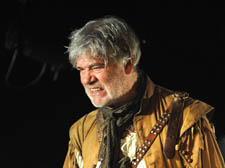|
|
 |
| |

Matthew Kelly |
The triumph of Victory is what it tells us about our humanity
VICTORY
Arcola Theatre
GOD forbid the BBC, a broadcaster so easily tempted by the periwigs and palpitations of historical drama, ever tries to adapt Howard Barker’s Victory: the Daily Mail would have them hung, drawn and quartered before the opening credits had stopped rolling.
Set in the early mistrustful days of Restoration England, Barker’s play is a swaggering, dangerous creature swollen with blood and bile and bodily fluids, as louche and lecherous as the newly appointed monarch at its heart, Charles II.
It is overlong, overwrought and faintly ridiculous; but it is also a compelling and frequently brilliant work, larded with some of the choicest unpasteurised language one is likely to hear on a stage.
Geraldine James is the Widow Bradshaw who, upon hearing that the corpse of her polemicist husband, Charles I’s assassin, has been exhumed and publicly hung in London, resolves to collect her spouse’s rotting remains come hell or high water.
Her journey leads her into destitution and rape at the hands of a clap-riddled cavalier (played with disarming gusto by Stars in their Eyes host Matthew Kelly), to service in the court of the king’s mistress (Evie Dawnay).
Though James’s statuesque bone-collector brings motive and empathy to proceedings, the best scenes are within the corridors of power.
Built on the ruins of Cromwell’s Commonwealth, Charles II’s court sits uneasily between brave new republic and craven Royalist brown-nosing. Nicholas Wroe is on fine, vainglorious form as the token monarch, desperate to be more than ermine window-dressing.
In a wonderful coup de théâtre at the end of Act I, the king, caustic with tavern ale, discovers the heads of state holding a secret meeting without him in the Bank of England vault. His response is limited to taunts and sneers; he cannot charge the men who make the law with treason.
Victory here has manifold interpretations: Phyrric in loss; sarcastic in its ratio of suffering
to glory; and inconsequential in terms of what civil war has truly achieved. None of them is pretty, but they tell us more about the human condition – the hunger that fires revolutions and the greed and hypocrisy that extinguishes them – than many would care to admit.
Until April 4
020 7503 1646 |

|
 |
|
|
 |
|



